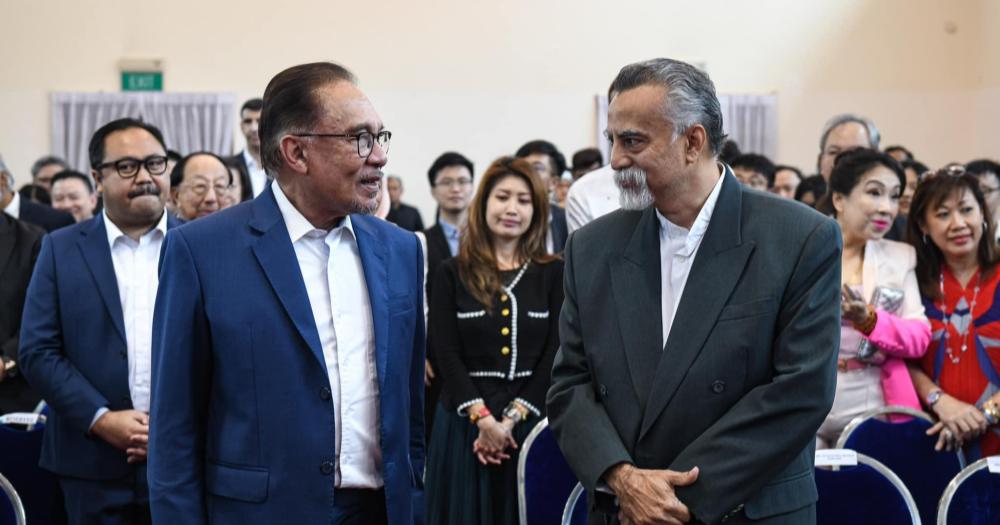Follow us on Telegram for the latest updates: https://t.me/mothershipsg
Malaysian Prime Minister Anwar Ibrahim gave a speech at his country's High Commission in Singapore on Jan. 30, addressing members of the Malaysian community in Singapore.
In the speech he contextualised Singapore-Malaysia relations in the context of domestic political challenges, the issues the two nations faced, and the opportunities good relations could garner.
Credibility and stability
Anwar said that his main challenge was to push back against corruption, and show his government to be stable and credible.
With that air of stability and credibility, it would make it much easier for Malaysia to attract foreign investment, Anwar said.
When speaking specifically about Singapore-Malaysian ties, Anwar mentioned that there were a “a lot of issues", but there was potential for "immense benefit" for both nations.
Air and space
As a point of contention, he gave the example of Malaysian airspace and Changi Airport.
"Is it reasonable to insist that in every movement at Changi Airport, they must get approval from Malaysia? I don't think it is necessary," he said. But he added that Malaysian airspace must be preserved as a matter of national sovereignty.
"But this is where good neighbours should negotiate to try and resolve. It does not need to take five decades or six decades to resolve that problem," he said.
While Anwar did not elaborate, he may be referring to an issue that cropped up in late 2018, when the Mahathir-led Pakatan Harapan coalition first got into power.
Bilateral agreement signed in 1974 for Singapore to manage airspace
The Transport Minister at the time, Anthony Loke, said that Malaysia wanted to "take back control" of the airspace over southern Johor, which has been managed by Singapore since 1974 after an agreement with Malaysia.
Our Ministry of Transport (MOT) explained that in 1974, a bilateral agreement was signed between Singapore and Malaysia to ensure efficient air traffic flows in and out of Singapore, which was approved by the International Civil Aviation Organization (ICAO).
Malaysia is an ICAO member, and has been since 1958. MOT said that while sovereignty is a fundamental aspect of international law, and Singapore respects Malaysia's sovereignty, the purpose of airspace management is to ensure the safety and efficiency of air traffic.
It noted that countries like the U.S., France and Australia had arrangements for airspace management to be provided by third parties. If Malaysia wishes to change these arrangements, it first has to consult with the ICAO.
Incidentally, Loke is today Malaysia's Transport Minister again, and accompanied Anwar on his visit to Singapore.
Doing what one can
Anwar said that both sides should work together to quickly resolves issues which both sides largely agreed on, and used the frequent traffic jams on the Causeway as an example.
Hundreds, thousands of Malaysians had to wake up at three or four AM in the morning and face massive queues at the Causeway in order to cross for work.
While both countries were working on long term ways to make the crossing easier, such as digital cards, such measures would take some time. In the interim, mitigating measures that could be taken, such as expanding the number of customs lanes.
Anwar said he suggested expanding the number of lanes from 15 to 30 in order to speed up clearance, and that he was giving immediate instructions to enact such measures to make crossings easier. PM Lee, he said, agreed to reciprocate such measures, with Singaporeans also possibly benefiting.
Anwar added that President Halimah Yacob had shared stories of friends and family who had to "wait 12 hours to cross" to get to Kuala Lumpur.
Anwar said that outside of elections, such an issue might be overlooked, but it meant “so much to these families” of people who had to cross the border daily.
"Semi-literate rascals": Anwar on people who said Malaysia should not maintain good relations with Singapore
Anwar also addressed how some Malaysians themselves reacted to Singapore-Malaysia relations.
He mentioned that there were people who said Malaysia should not deal with Singapore because it was a non-Malay or non-Muslim nation. Anwar rejected the idea that it was a majority view, saying it was "not Malaysian".
He dismissed such notions as the “desperate voice of some semi-literate rascals”. Instead, there was the potential for “immense benefit to both nations” in maintaining good relations.
In resolving complex issues, Anwar said there was opportunity to expand their scope. He brought up the long-standing water price issue Malaysia has, and suggested that as Johor has "limited resources", and the state of Pahang has "capacity", "let's look at the whole scheme".
Malaysia has lost the right to review the price of water
Singapore has reiterated its stance on the water price issue multiple times. In 2020 in Parliament, Foreign Minister Vivian Balakrishnan made clear that Malaysia has lost the right to review the price of water under the 1962 Water Agreement.
"We have told Malaysia this, as early as 2002, when Singapore last negotiated with Malaysia on water as part of the package deal," he said.
"Malaysia cannot unilaterally revise the price of water," he added. "Our legal position remains unchanged."
Vivian added that then-Prime Minister Mahathir Mohamad had brought up the issue with PM Lee on "several occasions" and wanted to review the price. He added:
"In the spirit of bilateral cooperation, but without prejudice to our position that Malaysia has lost the right of review, we have been willing to listen to and discuss Malaysia's proposals, on the basis that there is a balance of benefits for both sides."
Anwar closed his remarks by encouraging Malaysians to work hard and support each other, and work towards a better country.
You can watch a livestream of Anwar's speech at the Malaysian High Commission below:
Related stories
Top image via Anwar Ibrahim/Facebook
If you like what you read, follow us on Facebook, Instagram, Twitter and Telegram to get the latest updates.
